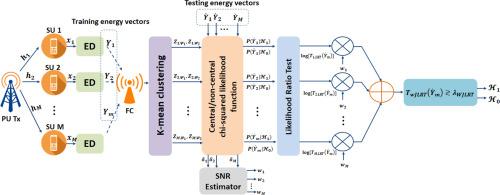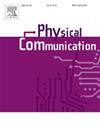利用 K-means 聚类实现合作频谱感知的加权联合 LRT
IF 2
4区 计算机科学
Q3 ENGINEERING, ELECTRICAL & ELECTRONIC
引用次数: 0
摘要
本文考虑了一种具有软决策融合功能的盲集中式合作频谱传感(CSS)。融合中心(FC)从合作的二级节点中构建能量向量。能量特征被认为是一种有效的测量方法,因为它被广泛使用,并与接收信号的强度直接相关。采用 K-means 聚类算法提取主用户(PU)信号缺失和存在分布的描述性统计特征,如平均值和非中心参数。在这种统计分析的框架内,每个节点的信噪比 (SNR) 都很容易估算和检查。平等、选择和加权组合技术被用于开发三种基于联合似然比检验(JLRT)的算法。这些算法是在简单假设检验的背景下实现的,其中数据的分布是完全指定的。此外,奈曼-皮尔逊(Neyman-Pearson)定理也证明了这些算法的合理性,该定理为给定显著性水平构建了最强大的检验。所提出的选择性和加权 JLRT 方法基于每个传感器的估计信噪比,反映了它们的可靠性。在平均信噪比较低、样本较少的瑞利衰落信道上模拟了几种拟议算法、K-means、模糊 C-means (FCM) 和 OR-rule 之间的比较情况。模拟结果表明,所提出的测试结果优于其他 CSS 技术。此外,还推导出了检测概率和误报概率的渐近理论表达式,这些表达式与模拟结果高度一致。本文章由计算机程序翻译,如有差异,请以英文原文为准。

Weighted joint LRTs for cooperative spectrum sensing using K-means clustering
In this paper, a blind centralized cooperative spectrum sensing (CSS) with soft decision fusion is considered. The fusion center (FC) constructs the energy vector from the collaborating secondary nodes. The energy feature is assumed to be an efficient measure, as it is widely used and directly correlates with the strength of the received signal. The K-means clustering algorithm is employed to extract descriptive statistical features about the distributions of the absence and presence of the primary user (PU) signal, such as the mean and non-centrality parameter. In the framework of this statistical analysis, the signal-to-noise ratio (SNR) at each node is easily estimated and examined. Equal, selective, and weighted combining techniques are applied to develop three joint likelihood ratio test (JLRT)-based algorithms. These algorithms are implemented in the context of simple hypothesis testing, where the distribution of the data is fully specified. Furthermore, they are justified by the Neyman-Pearson theorem, which constructs the most powerful test for a given significance level. The proposed selective and weighted JLRT approaches are based on the estimated SNRs at each sensor, reflecting their reliability. Several comparison scenarios between the proposed algorithms, K-means, fuzzy c-means (FCM), and OR-rule are simulated over Rayleigh fading channel with low average SNR and few samples. The simulation results reveal that the proposed tests outperform other CSS techniques. Additionally, asymptotic theoretical expressions for probability of detection and the probability of false alarm are derived, which show high agreement with the simulated results.
求助全文
通过发布文献求助,成功后即可免费获取论文全文。
去求助
来源期刊

Physical Communication
ENGINEERING, ELECTRICAL & ELECTRONICTELECO-TELECOMMUNICATIONS
CiteScore
5.00
自引率
9.10%
发文量
212
审稿时长
55 days
期刊介绍:
PHYCOM: Physical Communication is an international and archival journal providing complete coverage of all topics of interest to those involved in all aspects of physical layer communications. Theoretical research contributions presenting new techniques, concepts or analyses, applied contributions reporting on experiences and experiments, and tutorials are published.
Topics of interest include but are not limited to:
Physical layer issues of Wireless Local Area Networks, WiMAX, Wireless Mesh Networks, Sensor and Ad Hoc Networks, PCS Systems; Radio access protocols and algorithms for the physical layer; Spread Spectrum Communications; Channel Modeling; Detection and Estimation; Modulation and Coding; Multiplexing and Carrier Techniques; Broadband Wireless Communications; Wireless Personal Communications; Multi-user Detection; Signal Separation and Interference rejection: Multimedia Communications over Wireless; DSP Applications to Wireless Systems; Experimental and Prototype Results; Multiple Access Techniques; Space-time Processing; Synchronization Techniques; Error Control Techniques; Cryptography; Software Radios; Tracking; Resource Allocation and Inference Management; Multi-rate and Multi-carrier Communications; Cross layer Design and Optimization; Propagation and Channel Characterization; OFDM Systems; MIMO Systems; Ultra-Wideband Communications; Cognitive Radio System Architectures; Platforms and Hardware Implementations for the Support of Cognitive, Radio Systems; Cognitive Radio Resource Management and Dynamic Spectrum Sharing.
 求助内容:
求助内容: 应助结果提醒方式:
应助结果提醒方式:


